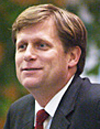Stanford Report, Feb. 3, 2004
Scholars proclaim U.S. policy in Iraq 'nuts,' 'a mess'
BY LISA TREI
At the opening of a panel discussion last week titled "What Are We Doing In Iraq?" political science Associate Professor Michael McFaul got straight to the point.
"We have no idea," he said. "We're making it up as we go along."
But McFaul cautioned that any U.S. administration would have faced similar challenges because the government is organized to fight the Cold War, not orchestrate power transitions abroad. "We do not do planning for this type of thing," he said. "Therefore, we're in the mess we're in."
The Stanford Institute for International Studies (SIIS) sponsored the public forum Jan. 26 to review developments in Iraq almost a year after the U.S.-led invasion. The speakers also discussed what is being done to transform the former dictatorship into a stable, democratic state. In addition to McFaul, economist John McMillan, SIIS Senior Fellow Donald Emmerson and SIIS Deputy Director Stephen Krasner participated in the lively, well-attended 90-minute event moderated by SIIS Director Coit D. Blacker.
McFaul said the biggest problem with the U.S. occupation is that it has set a fixed date of June 30, 2004, for Ambassador Paul Bremer, the president's envoy to Iraq, to hand over power to a transitional authority, regardless of whether the country is ready.
"The relationship between the occupation forces and transitional government is highly ill defined," McFaul said. "There are no rules of the game to negotiate and that, to me, is a recipe for disaster." The reality is, he said, on July 1, U.S. colonels will still be in charge on the ground.
Referring to Iraq's economy, McMillan's assessment was as blunt as McFaul's. "It's a mess," said McMillan, a professor at the Graduate School of Business and senior fellow at the Stanford Institute for Economic Policy Research. "It's in about as bad a shape as an economy could be."
McMillan presented grim statistics:
- In 1980, Iraq's gross domestic product (GDP) per capita was $3,300. By 2002, it had plummeted to $1,100.
- Under Saddam Hussein, Iraq had a command economy in which state-owned industry made up 75 percent of GDP. Prices were controlled; there was a heavy dependence on oil; almost no investment had taken place since 1982; and the country had no effective financial system. By 2002, Iraq had a 70 percent inflation rate.
In May 2003, McMillan said, the White House devised a confidential plan for Iraq's reconstruction, a summary of which was leaked to the Wall Street Journal. The professor questioned why such a plan was kept under wraps. "We're not talking about terrorism; we're not talking about national security," he said. "Why in the world does the Bush administration think Iraq's economy is a state secret?"
The road map revealed plans to create a mass privatization program similar to that used in Russia and to build a "world class" stock market in one year. "Nuts," McMillan responded. "We all know what happened in Russia. ... It was an economic, demographic and social disaster. If Iraq's GDP is half of what it is today in four years, [the country] will not be a 'beacon for democracy and prosperity' in the region."
According to McMillan, lessons learned from past privatizations could help Iraq avoid a Russian-style outcome. The problem is particularly acute because the economy is heavily dependent on oil, he said, a natural resource that generally leads to corruption as groups fight to control it.
The most important lesson in privatization is to avoid hubris, McMillan said. "Reforms that have worked have been those implemented with some degree of caution and backtracking, and with some empirical view of what's actually working on the ground," he said.
Emmerson argued that the United States needs to scale its expectations from a best to a worst possible outcome, a framework that he said was absent from President George W. Bush's latest State of the Union address, which called for the spread of freedom and democracy around the world. "There's a lack of realism concerning what is possible compared to what is desirable," Emmerson said. "We do need to accommodate uncertainty; we can't control everything in Iraq, especially if we're preparing to withdraw."
Emmerson rejected assertions that Iraq's Grand Ayatollah Ali al-Husseini al-Sistani, a key Shi'ite leader in Iraq who refuses to talk directly with Bremer, represents the most conservative form of Islam. "It's a mistake to think of Sistani as a stalking horse for a Khomeinist vision," he said, referring to the religious leader who led the 1979 Islamic revolution in Iran. Emmerson also cautioned against U.S. authorities opposing political Islam. "If you do, you drive [its supporters] to violence because that's the only alternative they have, since you're denying them access to a polity," he said.
Although the Bush administration wants a world with more democratic states, Krasner said, the conditions needed to establish a "resilient democracy" in Iraq do not exist. "A fully democratic Iraq is not something in the cards in the short run, given the structural situation in the country," he said. In the short term, Krasner said, Iraq needs some kind of government broadly recognized as legitimate at home and abroad. "We need to establish some elements of liberal structures first in the economy and justice systems and move to a democracy later," he said. "That's more likely, in the long run, to give us some kind of stable democratic regime."
![]()

John McMillan

Michael McFaul
![]()
